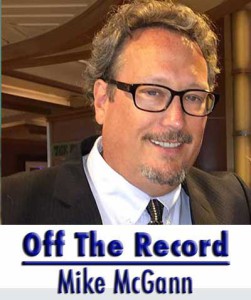But it does highlight need to fix funding formula, charter abuses
By Mike McGann, Editor, The Times
 The deal agreed to by the Unionville-Chadds Ford School District and its teachers union earlier this month isn’t perfect, but it is a deal the teachers and the greater community can live with.
The deal agreed to by the Unionville-Chadds Ford School District and its teachers union earlier this month isn’t perfect, but it is a deal the teachers and the greater community can live with.
Salaries will increase 2.79% annually over the term of the pact — above the likely Act I index, but only slightly. And if, as is expected, pressure mounts for the Wolf Administration to restore the planned sunsetting of exemptions for pensions and special education, it shouldn’t end up being a crisis.
I get the fact that those on fixed incomes don’t like the idea of paying more in taxes. But I do think a couple of facts should be thrown out there:
First, if you ever sent a kid to UCFSD schools, it’s a bit silly to think you should only have to pay school taxes for the 13 years your kid was in school. Assuming a cost of $15,000 per year (which is probably low) and a school tax payout of $5,000 a year (probably high), you’d have to pay your property taxes for 39 years before being in the red. If you had more than one kid — well, you get the idea. And of course, that doesn’t count for the ancillary benefits of having a well-educated community, both economic and personally.
If you sent your kid somewhere else — well someone, somewhere paid a lot to educate your kids (either you, in opting for private school, or taxpayers in whatever public district you were in) and there remains a moral obligation to the greater community.
Second: with the UCFSD’s exceptional ratings as a school district, all of our homes are worth as much as $20,000 (a conservative number, based on the frequency of calls I get from realtors wanting to know if I might want to sell) more than comparable homes in neighboring school districts. The math suggests that spending an extra $100-200 a year in taxes to maintain that value is a sound investment.
Third: Pennsylvania’s funding formula for schools is ridiculous and needs revisions. A generation ago, the state funded 50% (on average) of the cost of education. Since then, the number has dropped to about 31% (on average), while adding a ton of unfunded mandates, especially in areas such as special education. This is how governors and state legislators in both parties have pushed their tax increases onto local school boards — and created the real estate tax mess we have now.
I might be more impressed with the arguments about the largess of similar teacher contracts (and UCFSD’s is pretty much right in the sweet spot of similar deals in and around Chester County) if I were seeing similar outrage over the abuses of charter schools — another gift from state legislators and governors — especially when it comes to special education students.
Privately, a number of local public school administrators, express their frustration at these schools — some run by for-profit companies despite a technical ban on such things — cherry picking special education students, so as to take those with the least disabilities and yet charging local districts $40,000 a year for their education. That’s our tax money going to flesh out the profit margin of a private corporation.
And by the way, that’s tax money we have no say in how it is spent. No local elected official directly oversees local charter schools, which may explain why the for-profit companies rack up the profits while turning in some of the state’s worst test scores. There’s no one I can vote out of office if I’m frustrated by the way the local charter school is operated, unlike my local public school.
No, this isn’t a blanket condemnation of charter schools, some of which are well run and provided needed alternatives to failing public schools — but point to the lack of transparency and oversight for these schools. I want accountability for my tax dollars — and I don’t get it. From here, it appears that campaign contributions from said companies drives a lot more policy decisions than what is best for taxpayers or students.








100% of tax increases go to the pay for the Pension mess. The money does not go to the children. Charter schools, special education etc………..all red herrings to get citizens off of the real culprit.
LOOK AT THE BUDGET. SEE WHERE THE MONEY GOES. SEE WHERE THE TRUE COST INCREASES ARE.
Spec. ed costs- small sliver of the budget
Charter school- small sliver of the budget
Let’s start and continue to talk about the real issue.
Mike,
You have incorrectly stated that “Salaries will increase 2.79% annually over the term of the pact”. Not so. Salaries will increase by 2.4% annually and benefits will increase an additional 2.2% annually giving teachers a compensation increase (salary+ benefits) of 4.6% each year for 4 years. We can sit with the business manager if you’d like clarification. The number you stated, 2.79%, is the increase in local real estate tax dollars needed to fund the teaching workforce. The 2.79% number does not take into account the tax dollars (from us) contributed by the state.
You state that this “deal is something everyone can live with”. Yes, we can live with it, but we could do much better. I don’t think there are many residents that are receiving 4.6% annual compensation increases guaranteed 4 years into the future.
Keith,
Not to be argumentative, but I’m looking at a UCFSD handout that says (and I quote): Total cost estimate, four year average: 2.79%. I would like to think the school district is a reliable source of information on its own budget.
Now, if you’re going to argue that pension costs and escalations in the pension fund payment, including state match of 50%, could well push the number to the 4.6% number you describe, I guess it is possible. Of course, as you will likely remember, your colleague, Dr. Michael Rock, appeared to take issue with you on that calculation during the Sept. 8 meeting.
However, it is important to note that the district and state previously earned and should have banked pension savings from 2001 through 2009 (paying as little as 1.0% while teachers paid 7.5% or more of salary each and every year) and did not (and both bodies actually raised taxes much higher than is the current norm).
A fair calculation in my mind would be to match the rate the teachers pay (7.5%) and consider anything beyond that paying off an overdue credit card — and one would hope an object lesson in truly conservative fiscal management.
That’s not a number I could easily divine (liberal arts education and such) — and one that might be a bit esoteric, to be honest.
Frankly, I also have issue with letting the legislature, Gov. Ridge & Gov. Rendell and previous school boards (to a much, much lesser degree as the rate of pension payments is determined by the state) off the hook for failing cover true costs and instead place the blame on the teachers who were the only ones paying their fair share for many years.
None of this changes my basic point: state school funding is broken and no one is saying much about charter school abuses.
Well, it’s true that the total cost TO THE LOCAL REAL ESTATE TAXPAYER is 2.79% per year, but it’s also true that the average compensation increase to the teachers is 4.6%. (Dr. Rock was wrong and that’s why I offered the guidance of the business manager)
I see you believe the myth that there were “pension savings from 2001 through 2009” and the teachers paid their “fair share” while the district didn’t.
It is true that the district’s pension contribution rate was held low by legislation during the 2001-2009 time period. Did the taxpayer’s benefit by lower tax rates? No. Tax rates during that timer period were above 5% per year. So who did benefit? The teachers! During the “low rate” time period (2001 – 2009) the union asked for and the district was able to afford large salary increases. Here are two examples (not cherry picked) of teachers from the negotiating team. One received an average 7% salary increase per year; the other 10%. (we could examine any teacher’s salary during that time period since salaries are public record) Rather than suffering, the teachers were the beneficiaries of large salary increases during the 2001-09 time period. Thus, I don’t buy into the argument that the current 4.6% increases are justified because of supposed sacrifice during the 2001-09 timer period.
The union promotes the myths of “Act 9 was solely the legislator’s fault”, “we paid our fair share, but the district didn’t”, “If only the district had saved”, and “the district took a tax holiday”. Each of these myths has an element of truth and that’s what makes them believable. However, just like every other myth they are inaccurate.
I agree that the state’s funding formula is broken and there are charter school abuses. But my point is that 4.6% compensation increases cannot be justified.
If 4.6% compensation increases cannot be justifies for teachers, how can 8% increases be justified for an Assistant Supt. bringing his salary to $193,199?
Please go to:http://www.npr.org/sections/ed/2014/09/04/345503073/the-myth-of-the-superstar-superintendent
“We just don’t see a whole lot of difference in student achievement that correlates with who the superintendent happens to be,”
says Matthew Chingos, a senior fellow at the Brown Center on Education Policy at the Brookings Institution. He’s a co-author of what’s likely the first broad study to examine the link between superintendents and student achievement.
Yet Keith continues to advocate and get huge compensation plans including outlandish raises for these employees that will enable them to receive more pay in their retirement years than in their working years. Tax paying citizens working hard to pay these over the top plans will get no where near the same in their retirement years.